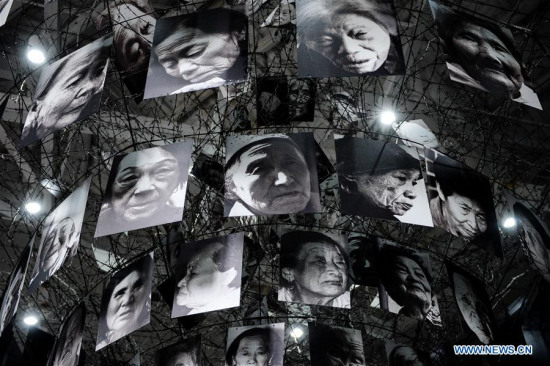
Portraits of victims are hung in the memorial for "comfort women" in Nanjing, east China's Jiangsu Province, Dec. 1, 2015. (Xinhua/Li Xiang)
A memorial for "comfort women" during World War II opened to the public in east China's Jiangsu Province on Tuesday.
It is the first memorial in China's mainland dedicated to the group, and was identified by the victims as a military brothel run by the invading Japanese more than 70 years ago.
The memorial in Jiangsu's capital Nanjing covered more than 3,000 square meters and comprised of eight two-storey buildings.
The Japanese took the city, then China's capital, on Dec. 13, 1937, where they killed 300,000 people within six weeks in what was later called as Nanjing Massacre, or the Rape of Nanking.
They opened a brothel for soldiers in the Liji Alley at the end of 1937. It was closed after the Japanese surrendered in 1945 and is now the largest former "comfort station" still standing.
An estimated 200,000 women from China and many others from the Korean Peninsula, the Philippines, Indonesia and some other countries, euphemistically known as "comfort women", were forced into sexual servitude by Japanese troops. Many of them died.
In Nanjing alone, more than 40 military brothels were opened.
In the courtyard of the memorial there are sculptures of three "comfort women", including one who appeared pregnant. The statue is posed with her hand on her belly, seemingly sad and helpless. The woman was Pak Yong-sim from Korea.
Once living in Room 19 of building No. 2, Pak revisited the site on Nov. 21, 2003. She died in 2012.
More than 1,600 articles and 680 photos are on exhibition, including kalium permanganicum given to the memorial by late victim Lei Guiying. The powders were used in the brothel for disinfection.
"My mom was raped at the age of nine, and became a 'comfort woman" at 13," said Tang Jiaguo, Lei's adopted son. "She didn't want to talk about her past until 2006, when she testified for the crime of Japanese."
Lei passed away in 2007. In her will she wrote "may the tragedy not be repeated. May there be no more wars."
Another important exhibit was an endoscope used in health checks for the women. There were also condoms with characters on the package that read "violent attack".
Li Bangxian's house was once taken by the Japanese as another "comfort station". "I gave the bed, cabinet and chairs left by the Japanese soldiers to the memorial, so that the world could know what they did in those years," he said.
"For a long time, the history of 'comfort women' was buried," said Su Zhiliang, a professor with the Shanghai Normal University who has been studying the issue for decades. "In recent years, the Japanese made repeated attempts to tamper with history. The move angered many whose countries had been plagued by the 'comfort woman' system. That is why countries like China research and protect the history."
Yun Ju-Keyng from South Korea, president of the history museum Independence Hall of Korea, was one of the 300 plus people present at the opening ceremony on Tuesday.
"This year marks the 70th anniversary of China's victory over Japanese invaders, and also independence of the South Korea," she said. "Denial of the Japanese government over the past crimes hurt the victims, who are elderly now, a second time. China and South Korea should join hands in exposing the atrocities of the Japanese imperial army, so that the former 'comfort women' could live to see the offenders apologize."
China's attempt to have the "comfort women" document, or what is called "sex slaves for Imperial Japanese troops", inscribed in UNESCO's Memory of the World Register failed this year, although the country's nomination of the Nanjing Massacre dossier was inscribed.
The International Advisory Committee of UNESCO's Memory of the World Programme encouraged countries to jointly nominate the "comfort women" files, according to its application guidance, and will review this application in its next meeting in 2017.
"While my mom was alive, she told me that she was going to bear witness until the Japanese fully recognized the fact," said Tang Jiaguo. "Before she died, she said 'I have son, and grandchildren. They will fight for the truth, generation after generation'."


















































